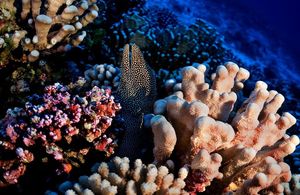UK to continue global leadership on marine protection
The UK will continue as Chair of the Global Ocean Alliance as it calls for more ambition to meet the 30by30 ocean pledge.

Moray eel Corals, Henderson Island. Credit: Luke Hosty.
Environment Secretary Thérèse Coffey today urged more countries to join the more than 120 nations who already support the pledge to protect 30% of the world’s ocean by 2030.
Speaking as global leaders came together to tackle the global biodiversity crisis at the UN Conference of Biological Diversity (CBD) CO15 in Montreal, Canada, the Environment Secretary led calls for more ambitious and meaningful outcomes for ocean protection and confirmed the UK will renew its role as Chair of the Global Ocean Alliance beyond COP15.
By continuing in this role, the UK will remain as a leading voice in pushing for ambitious ocean action and the implementation of the Global Biodiversity Framework in the marine environment.
It comes as Defra announced that £20 million in grants – worth between £250,000 and £3 million – will be made available to local organisations around the world to help tackle illegal fishing and fight marine pollution, as well as sustainably managing Marine Protected Areas (MPAs) and protecting rare habitats and species.
Alongside this, the UK will contribute a further £17 million of aid from the Blue Planet Fund to the World Bank’s PROBLUE programme, bringing total UK support to PROBLUE to £25 million. To date, PROBLUE has helped over 100 projects in more than 70 countries, including supporting the ASEAN regional plastic waste trade, and India’s transition to a regulated sustainable fishery regime.
Speaking at the Convention on Biological Diversity COP15 during IOC-UNESCO Ocean Action Day, Environment Secretary Thérèse Coffey said:
It is almost impossible to overstate the importance of a healthy, safe, sustainably used ocean for millions of people all around the world.
I’m delighted to confirm that the UK will continue as Chair of the Global Ocean Alliance where we are committed to securing the maximum possible ambition and achieving the greatest possible impact to put nature on a road to recovery and help us protect at least 30% of the global ocean by 2030.
The UK’s £500 million Blue Planet Fund supports developing countries to protect the marine environment and reduce poverty. Initial investment of £20 million for OCEAN (Ocean Community Empowerment And Nature), a new competitive grants programme, will support innovative proposals from in-country organisations that secure healthy marine ecosystems and reduce overfishing. They will also ensure communities have increased capacity to manage marine pollution.
PROBLUE, a World Bank Multi-Donor Trust Fund, supports projects around the world that focus on the sustainable management of fisheries and aquaculture. The UK Government’s investment will help address marine pollution, support the development offshore renewable energy and help governments around the world to better manage their marine and coastal resources. Since its launch, PROBLUE has provided support to over 100 projects in more than 70 countries.
Pitcairn Islands in focus
The UK Government’s leadership on ocean protection extends across the globe, as new survey findings from Cefas (Centre for Environment, Fisheries and Aquaculture Science) and Blue Abacus has today revealed.
The Pitcairn Islands, a UK Overseas Territory in the Pacific Ocean, are home to one of the world’s largest Marine Protected Areas (MPA) – three-and-a-half times the size of the UK. Its waters are some of the most remote and understudied in the world and contain rare and endangered species.
Established as a no-take zone in 2019, Pitcairn’s MPA area prohibits commercial fishing, drilling and other extractive activities. Shark fishing was also banned in 2018.
A two-week expedition in 2021 funded by the UK Government’s Blue Belt Programme uncovered key findings on rare species like sharks and humpback whales, in addition to the impacts of climate change on coral reefs. Key findings include:
- Sharks were observed in over half (66%) of all the underwater surveys, with multiple species (such as Grey Reef shark, Galapagos shark and the Whitetip Reef Shark) observed in half (51%). It suggests that the ban on shark fishing has had an impact in supporting healthy shark populations, which are higher than the global average (it is estimated that sharks have disappeared from a quarter of the world’s reefs).
- Six individual humpback whales were seen on the seabed with many more recorded from surface observations, including mothers and their calves. The age of the calves indicates that the whales are using the Pitcairn MPA as a calving and nursery ground safe from human activities and threats.
- A total of 7,319 individual fish were recorded from 203 different species, including endemic fish species, such as the many-spined butterflyfish (Hemitaurichthys multispinosus).
Simeon Archer Rand, Senior Marine Advisor at the Centre for Environment, Fisheries and Aquaculture Science (Cefas), commented:
The results of this landmark survey are a significant success for the Pitcairn Islands. This community in the Pacific Ocean is guardian of one of the world’s largest no-take Marine Protected Areas, providing a sanctuary for marine life in the vast Pacific Ocean. The island has strong cultural links to the ocean and its passion to protect it is clearly shown in its actions.
Since 2016 we in the Blue Belt Programme have assisted the island community to further their ability to monitor their marine environment, as well as strengthen the governance of the invaluable MPA.
The survey data collected will help Pitcairn to effectively manage the MPA, ensuring these key habitats are protected into the future. But there is still a lot to learn. We are just beginning our journey in terms of understanding this globally important region.
From 2016 until March 2022, the Blue Belt Programme has been supported by £35 million of UK Government funding, with a further £8 million committed this financial year until March 2023.